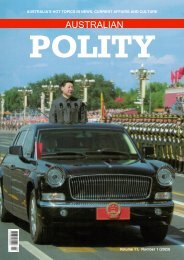Australian Polity, Volume 9 Number 3 - Digital Version
Australia's hot topics in news, current affairs and culture
Australia's hot topics in news, current affairs and culture
Create successful ePaper yourself
Turn your PDF publications into a flip-book with our unique Google optimized e-Paper software.
before accepting a port of a mobile service number
• The Telecommunications (Service Provider —
Identity Checks for Prepaid Mobile Carriage Services)
Determination 2017 which similarly requires carriage
service providers to obtain certain identifying information
about, and to verify the identity of, the customer.
Further, the Anti-Money Laundering and Counter-
Terrorism Financing Act 2006 is an example of the use of
the incidental power to impose identification requirements
on entities captured by the Commonwealth’s banking
and/or corporations powers under the Constitution. In
addition the soon-to-be-replaced (by the recently passed
Online Safety Bill 2021) Enhancing Online Safety Act
2015 – which already regulates social media companies
to an extent – is another example of the Commonwealth
using a range of constitutional powers as a basis for
regulating social media companies.
A recent House of Representatives Standing Committee
Inquiry into family, domestic and sexual violence report
recommended that:
In order to open or maintain an existing social media
account, customers should be required by law to
identify themselves to a platform using 100 points
of identification, in the same way as a person must
provide identification for a mobile phone account, or
to buy a mobile SIM card.
Using existing legislation
The Online Safety Bill was recently passed by
the Parliament. Once it commences, the eSafety
Commissioner would have various powers, including
the power to make Service Provider Determinations,
under Clause 151 of the Bill.
This specifically allows for the creation, by legislative
instrument, of rules that would ‘apply to providers of
social media services in relation to the provision of social
media services.’ Whilst any such rules must relate to
matters specified in the Legislative rules made by the
Minister, the rules could impose a requirement on social
media service providers to require identification to open
or continue to operate an account.
There are potentially other avenues by which the
Commissioner could require or incentivise social media
platforms to require identification to open an account,
including through the Basic Online Safety Expectations
(BOSE) scheme, or by the setting of Industry Standards
and development of Industry Codes.
Corporations Power
Section 51(xx) provides that the Parliament shall have
power to make laws with respect to:
…foreign corporations, and trading or financial
corporations formed within the limits of the
Commonwealth;
A constitutional corporation is defined in such a way
as to capture the types of entities that most frequently
own and operate social media services. This is because
the Constitution allows the Commonwealth to make
laws with respect to foreign corporations that carry on
business within Australia, as well as trading and financial
corporations formed within Australia. This power has
been interpreted broadly.
Recent High Court cases have interpreted the
corporations power very broadly and expansively and
as a result it appears that the Commonwealth can
use this power to regulate all activities and aspects
of constitutional corporations, including their internal
operations. Consequently, it would almost certainly be
possible for the Commonwealth to place obligations on
social media providers (in their right as corporations) to
require identification of users, as a regulation of their
business as a corporation.
Another alternative
Another alternative would be to provide that if a social
media provider had failed to identify the account holder
(ie the user), in an action for defamation, the social media
provider would be liable for any damages arising from
the claim. In any event, the Commonwealth clearly has
the power to legislate.
I acknowledge the research of the Australian Parliamentary Library.
Australian Polity 15





